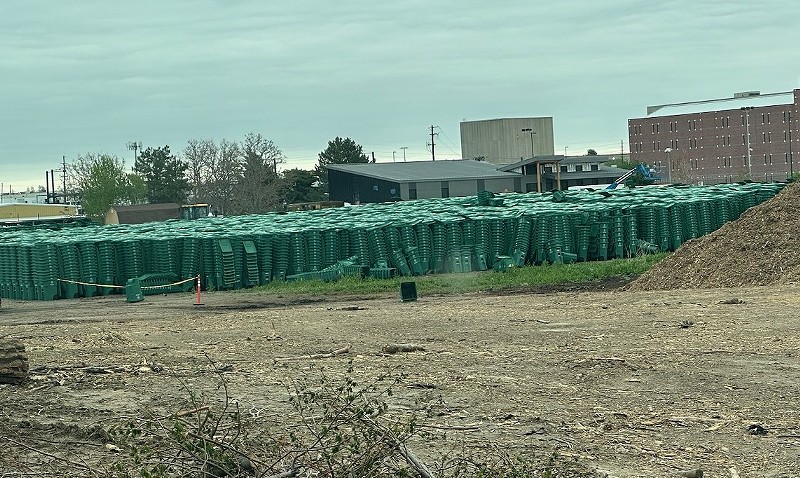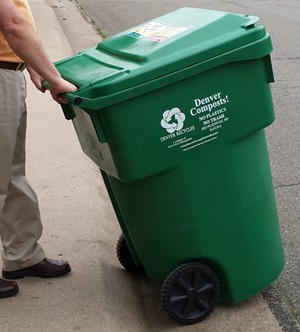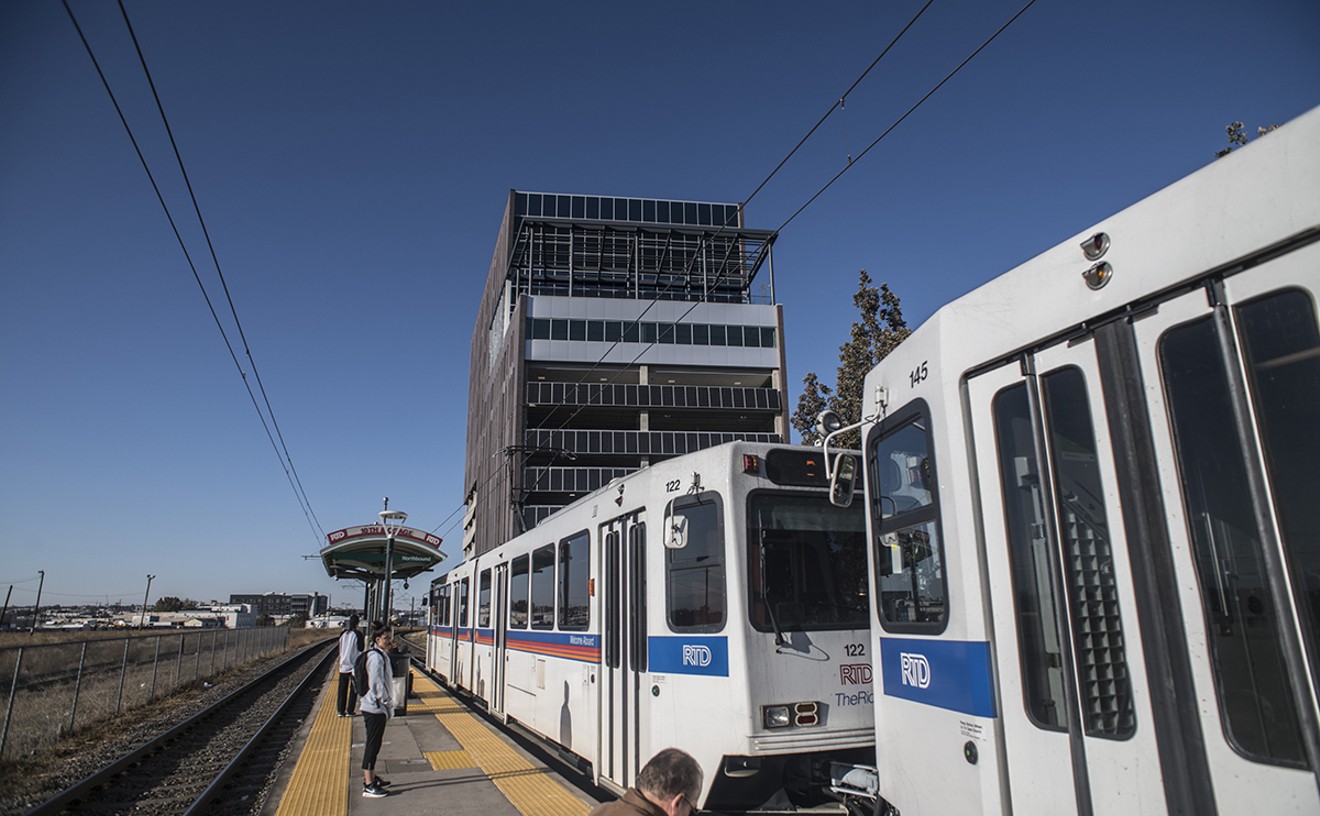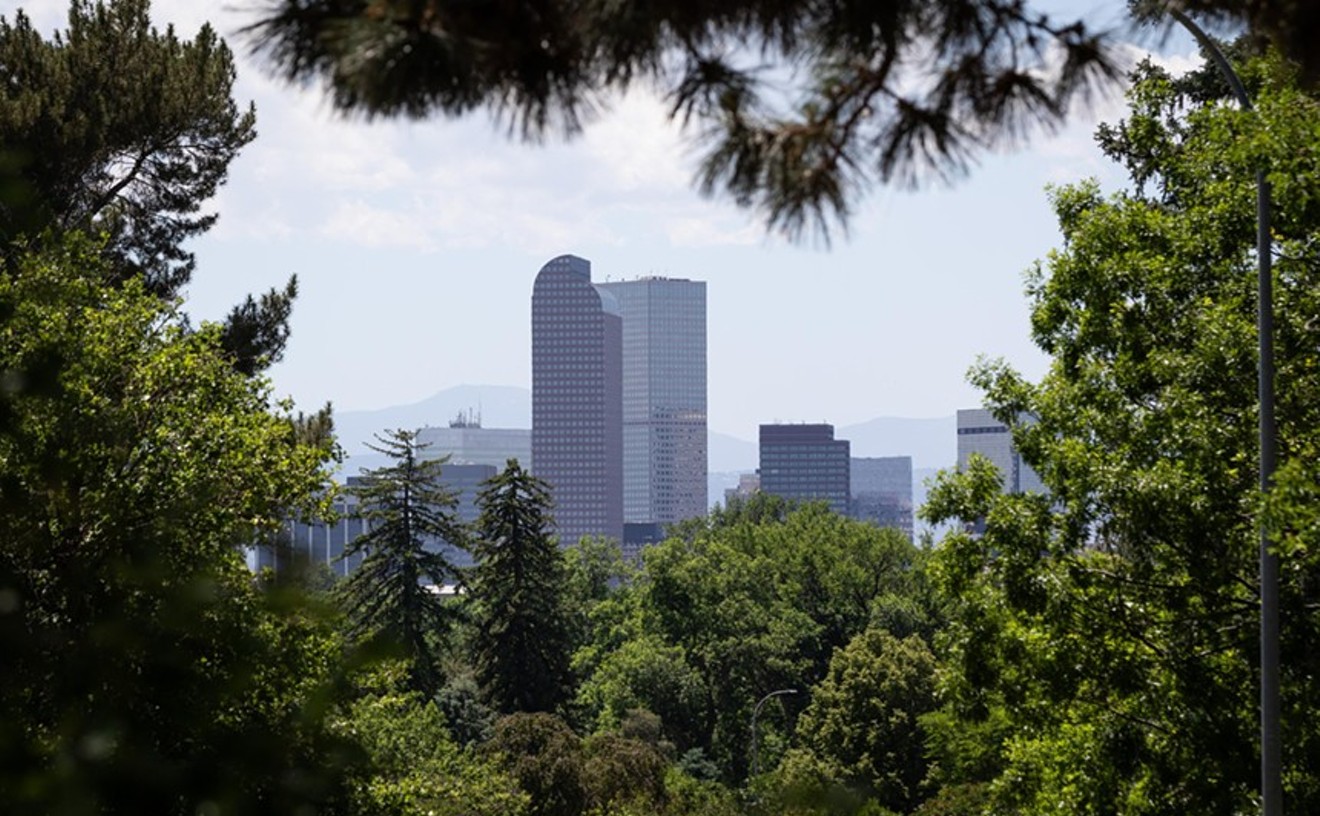It’s been nearly two years since Denver City Council approved its new Pay As You Throw trash system, where every resident would get new compost carts, but the rollout has been slow.
In addition to weekly recycling pickups and charging residents for trash services, citywide compost bins were part of a plan to increase the city’s poor waste diversion rate. City waste management officials estimated that about 75 percent of what is thrown away in Denver can be composted or recycled.
But only 3 percent more waste has been diverted from the landfill over the past year, with about 12,000 more residences receiving compost carts in that span.
Although Denver's waste diversion rate improved since the new system was implemented, going from 23 percent to 26 percent, city officials and environmentally focused residents are wondering what’s taking so long for compost carts to be delivered citywide.
“On the green cart rollout, is it so slow because we can't get the buckets, or we don't have the drivers?” City Councilman Paul Kashmann asked during a Land Use, Transportation & Infrastructure committee meeting on May 14.
According to Nina Waysdorf, the Denver Department of Transportation & Infrastructure’s (DOTI) manager of waste diversion and recycling, the department has the carts and the employees but needs to educate residents to make sure they are composting effectively each time it expands compost services.
“We don't want to drop off 150,000 carts and expect people to do it perfectly every time,” she said.
The department’s strategy has been to expand each of its nine Solid Waste Collection Districts one at a time, starting with District 2 in the city center and then District 4 by the airport. According to DOTI, areas with the lowest diversion rates are prioritized. The department plans to add one district per quarter, which would mean some people don’t get compost bins until the end of 2025.
Given the city's goal of achieving a 50 percent diversion rate by 2027 and a 70 percent rate by 2032, city councilors questioned if the speed of the rollout is too slow.
“That doesn't impress me,” Kashmann said of a 3 percent increase in waste diversion. “I'm not trying to be rude, but I would have hoped a couple years down the line, that we would have a greater increase.”
Waysdorf insisted that without composting education, the bins could be contaminated and rejected by the third-party compost processor the city uses, which would hurt Denver’s diversion rate.
The next district to get compost carts will be Solid Waste Collection District 5, which includes the Athmar Park, Auraria, Baker, Barnum, Barnum West, Civic Center, Lincoln Park, Sun Valley, Union Station, Valverde, Villa Park, Westwood and West Colfax neighborhoods, as well as parts of the Central Business District.
Customers in that district should expect letters in the mail at the end of the month where they can select their trash cart size; DOTI hopes that adding compost bins will lead to smaller trash bins around Denver.
The expanded waste services ordinance allows people to pick what size trash can they want to pay for. The options are 35 gallons, which fits two to three tall kitchen bags, for $9 a month; 65 gallons, which fits four to five bags, for $13 a month; and 95 gallons, which fits seven to eight bags, for $21 a month.
Around 5,700 people are currently participating in a city rebate program that covers all or some the expense for households making under a certain amount of money, starting with $52,140 for a single person.
DOTI recommends that people wait to get their compost carts before adjusting their sizing, which can be done on Denver Utilities Online. Denver residents who are paying for trash service but haven’t received composting service yet are getting a $9 quarterly credit on their bills until their neighborhood gets green carts.
According to Rich Villa, interim director of solid waste management at DOTI, the city has 180,000 residential customers along with other city-owned facilities including the Denver Public Schools. Just over 40,000 of those residential customers currently have compost carts, including approximately 30,000 who had voluntarily signed up before the ordinance passed.
DOTI only services single-family homes or complexes with seven or fewer units. People in larger buildings who have signed up for a personal composting service, such as the Denver Compost Collective, are not counted in the city's numbers regarding how many households are composting right now. However, all waste streams are examined and counted in the city's waste diversion percentage, so those composters do contribute.
The Denver Compost Collective is designed exclusively for apartment buildings, as those aren't served by the city. It gives each apartment a pail to prevent contamination and turns the waste into useable soil, which is then gives to local farms for free to close the loop on the materials. The company has around 1,000 members; that, combined with yard waste from landscape companies and leaf collection in the fall, amounts to just shy of a quarter million pounds of material processed per year, according to the Collective.
Joshua Salazar, an operations manager in DOTI’s solid waste division, said that when DOTI had to roll out weekly recycling, the department realized it needed more equipment and personnel than originally predicted, and reaching those goals took time. Solid waste is about 85 percent staffed right now, he added.
In 2023, DOTI had a 95 percent service completion rate. So far in 2024, it’s sitting at a 94 percent completion rate.
Waysdorf said DOTI is undergoing a cost-of-service study to see if the pricing is effective; Salazar said the department is working on incentivizing more people to sign on to its workforce.
Councilmember Amanda Sawyer said she's noticing other efficiency issues in DOTI’s system, however. According to Sawyer, she hasn’t had her recycling picked up for the last four weeks, pointing out that in the private sector, even a 99 percent pickup rate is frowned upon.
Sawyer said she worries that if DOTI needs to increase prices to cover the program, as is allowed by the city ordinance, people will be upset at the higher cost if they experience missed pickups or still don’t have their compost carts.
“If the $21 a month per cart is not covering the costs of this program, with that bad of service we don't really have a leg to stand on to raise the cost, so what are we going to do about that?” she said during the May 14 hearing. “What is the plan?”
According to DOTI, the department is trying to communicate with those who have carts and those who will get them about what can and can’t be composted.
Right now, only food scraps, yard waste and certified compostable bags under three gallons can go into compost bins. According to Nancy Kuhn, a spokesperson for DOTI, if the department can move faster on the compost rollout without compromising the purity of the compost, it will do so.
In the two districts where compost has been rolled out, there were “a lot of challenges with contamination,” Waysdorf said.
But once the city completed its education, including auditing people’s trash and communicating with them directly about errors the trash inspectors found, the results were positive.
“What we saw is very, very low contamination,” Waysdorf said. “So that's great.”
In addition to the city rollout to residences, most businesses will soon be required to provide recycling and composting by the Waste No More ordinance passed by voters in November 2022, so the slow progress to more waste diversion in Denver will continue. The Denver Compost Collective says it has already brought more entire apartment communities online as they look to fulfill their obligations through the ordinance.
[
{
"name": "Air - MediumRectangle - Inline Content - Mobile Display Size",
"component": "12017618",
"insertPoint": "2",
"requiredCountToDisplay": "2"
},{
"name": "Editor Picks",
"component": "17242653",
"insertPoint": "4",
"requiredCountToDisplay": "1"
},{
"name": "Inline Links",
"component": "18838239",
"insertPoint": "8th",
"startingPoint": 8,
"requiredCountToDisplay": "7",
"maxInsertions": 25
},{
"name": "Air - MediumRectangle - Combo - Inline Content",
"component": "17261320",
"insertPoint": "8th",
"startingPoint": 8,
"requiredCountToDisplay": "7",
"maxInsertions": 25
},{
"name": "Inline Links",
"component": "18838239",
"insertPoint": "8th",
"startingPoint": 12,
"requiredCountToDisplay": "11",
"maxInsertions": 25
},{
"name": "Air - Leaderboard Tower - Combo - Inline Content",
"component": "17261321",
"insertPoint": "8th",
"startingPoint": 12,
"requiredCountToDisplay": "11",
"maxInsertions": 25
}
]












